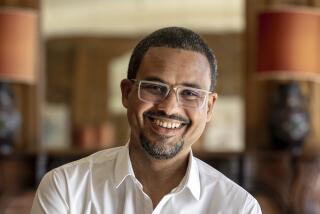Furor Over Pasteur : Fewer Words of Wisdom Are French
- Share via
PARIS — “Scandalous and absurd,” one of France’s greatest living historians said.
“An admission of impotence,” a senior government official said.
“This is the drop of water that will cause the whole vase to overflow,” a famous paleontologist said.
The issue riling these and other Frenchmen, transporting them into a kind of Francophone frenzy, was an old sore point: the invasion of their beloved French language by its main rival, English.
But this time the concern was not the proliferation of English-inspired jargon ( le look, le fast food or, a current favorite, les baskets , meaning tennis or jogging shoes). In the eyes of those who guard the French language, it was much more serious.
Pasteur Switches to English
Earlier this year, quietly and suddenly, the Pasteur Institute of Paris decided to rename three of its most important scientific journals and publish them in English. When the decision became publicly known, in late March, it exacerbated the insecurity of some Frenchmen about the ability of their language to keep up in the English-dominated world of science.
“In my eyes,” said historian Alain Decaux, who also serves as France’s minister-delegate to 40 French-speaking nations in the world, “the Pasteur Institute affair is a perfect illustration of the progressive degradation of French as the language of science and technology.”
The reaction of the prestigious Academie Francaise was even stronger. The 40-member body, composed of France’s leading intellectuals, urged the Pasteur Institute to immediately rescind its decision, which it termed “a demonstration of the unjustified surrender of a part of the French scientific community.”
Enemies Within
As a result, the scholars of the academy warned, “the worst enemies of the French language are now inside France.”
Because the Pasteur Institute is a private foundation, the French government has no control over its policies. But Thierry de Beauce, the official in charge of international cultural relations for the Ministry of Foreign Affairs, expressed his outrage this week by ordering all French diplomatic posts to cancel their subscriptions to the Pasteur journals.
Concern over the decline of French in scientific and technological areas has come to a head in recent years. Three years ago, French President Francois Mitterrand expressed his alarm over English-language dominance of computer science in a speech before the Academie Francaise.
“Either the French language learns to master computer technology,” Mitterrand said, “or, in a few years, it ceases to be one of the great means of communication in the world.”
One happy result of huge challenges facing the French language in science is that French intellectuals have stopped being so touchy about those minor intrusions on their tongue known collectively as Franglais.
Historian Decaux, for example, outraged over the Pasteur Institute episode, is much more forgiving about Franglais.
“Franglais is not a matter of great gravity,” he said in a recent interview. “Often these are just fake English words that one adopts by adding ‘ing.’ This doesn’t bother me. Language cannot remain immobile. These are just the sounds of language growing.”
A 1975 law created to prosecute businesses that used English words in place of French counterparts has been seldom invoked in recent years. Under proddings of a linguistic watchdog, the Assn. of Users of the French Language, the law once resulted in a fine against the Paris Opera for using English in a program.
Meanwhile, included in a new guide to the popular argot are several recent additions to the Franglais vocabulary, including le zapping and les streets.
Channel Changing
Le zapping, explains author Pierre Merle in his book, “Dictionary of Plugged-In French: Guide to French Tick and Tock,” is what happens when someone changes television channels rapidly with a remote-control device (un zappeur).
Meanwhile, les streets has now been adapted as the word for the increasing number of skateboarders on Paris sidewalks, producing such colorful expressions--roughly translated--as: “My dad freaked out, but I flipped when I saw those streets streeting down the street.”
Compared to issues and symbolism involved in the Pasteur case, bickerings over Franglais are small matters that occasionally produce odd exchanges of jargon. For example, in today’s idiom, an American is more likely to say savoir-faire than a Frenchman, who more often than not will employ the English equivalent: know-how.
In terms of pride and prestige, the Pasteur Institute ranks here alongside the Eiffel Tower, the rose window at Chartres and the collected works of Marcel Proust. The institute was established in 1887 by the great French scientist Louis Pasteur and figured in the creation of two important fields of modern science--immunology and microbiology.
“In those days we had practical exclusivity over those fields,” said Dr. Maxime Schwartz, the institute’s director and the man at the center of a swirling controversy over the decision to Anglicize publications that formerly appeared in French as the Annales de l’Institut Pasteur. They are now the Annals of the Pasteur Institute.
Even the research journal for immunology, the science spawned by Pasteur when he developed a vaccine for rabies in 1885, will appear under the English title Research in Immunology. And still worse, in some eyes, is the fact that Pasteur’s name has been reduced to being part of the subtitle.
To historian Decaux, dropping Pasteur’s name is akin to treason.
“I was astonished,” he said in an interview. “Not long ago I was in Vietnam. The authorities had removed all the French street names except for one, in the street named for Louis Pasteur. They leave it up in Vietnam while we are taking it down in France. It’s absurd.”
Schwartz, a prominent molecular biologist who last year became director of the Pasteur Institute, is surprised by the storm his decision has caused. But he defends the change as necessary to keeping alive the struggling French journals on immunology, microbiology and virology.
“You need a common language in science,” he said in an interview in his office, where a bust of Pasteur looked on. “Unfortunately, the one that has imposed itself is English. English has become the international language in science.”
Part of the problem, he said, has to do with le snobbisme of French scientists, many of whom would prefer to have their research published first in an American or British publication rather than in their native France. This hit close to home in 1983, when a Pasteur Institute researcher, Luc Montagnier, chose to announce his isolation of the AIDS virus (later disputed by a rival claim in the United States) in the American magazine Science instead of in one of the Pasteur journals.
Often, Schwartz said, there is good reason for the English bias.
“If a scientist wants his work to be known,” Schwartz said, “he has to publish it in a language others understand. There are examples of French journals having something first only to have a later American publication get credit.”
Under this kind of pressure, in 1973, editorial review boards at the Pasteur Institute began accepting articles in English. In that year about 10% of the articles were in English.
By 1987, close to 100% of the articles submitted to the institute were in English, even though about 60% of them came from researchers in French-speaking countries.
By last year it was clear that something more drastic needed to be done. The number of articles submitted for publication had fallen to a trickle. Quality was declining.
“We had to do something,” Schwartz said, “because the publications were in trouble.”
The most dramatic step came this year when the titles were changed to English and Louis Pasteur was demoted to subtitle status: “Established in 1887 as the Annales de l’Institut Pasteur.”
Perhaps even more important, Schwartz added American and British scientists to the editorial boards. M. H. Saier, a biologist at UC San Diego, sits on the editorial board of the Pasteur publication Research in Microbiology. H. Sakano of UC Berkeley is on the board for Research in Immunology.
Furor in Quebec
The most serious early reaction to the changes came from Quebec, where French-speaking Canadians reacted with outrage unequaled even in France. Quebec’s special envoy to France, Jean-Louis Roy, called on French leaders to respond urgently to what he described as the progressive decline of the French language in the fields of science and technology. If not checked, Roy warned, the decline would become irreversible in 10 years’ time.
Inspired by the Canadians, French scientists and language chauvinists have joined the cause.
“Our reaction is virulent,” said Daniel Pajaud, a paleontologist who founded a group called the National Assn. of Scientists for Use of the French Language. “We will not accept this decision nor the conditions under which it was made.”
In fact, the decision by the Pasteur Institute reflects a new realism about the importance of English that can be found at many levels of French society. A poster on the Avenue des Champs Elysees advertises English-language courses and advises passers-by to learn the “essential” language of the time.
Another, on the subway, warns passengers to get ready for the united Europe of 1992, the year set by the European Community for the elimination of borders between the 12 member-states. It says, in English: “1992: Are You Ready to Take Off?” And it adds, in French, “English is your ticket.”
So great is the concern over the power of English in the new Europe that Alain Minc, a business consultant, caused hardly a stir with his new book, “La Grande Illusion,” in which he urges his countrymen to swallow their linguistic pride and learn English in order to survive.
To Minc, “there is only one true European language, English, perhaps the only major contribution by the British to Europe.”
More to Read
Sign up for Essential California
The most important California stories and recommendations in your inbox every morning.
You may occasionally receive promotional content from the Los Angeles Times.













